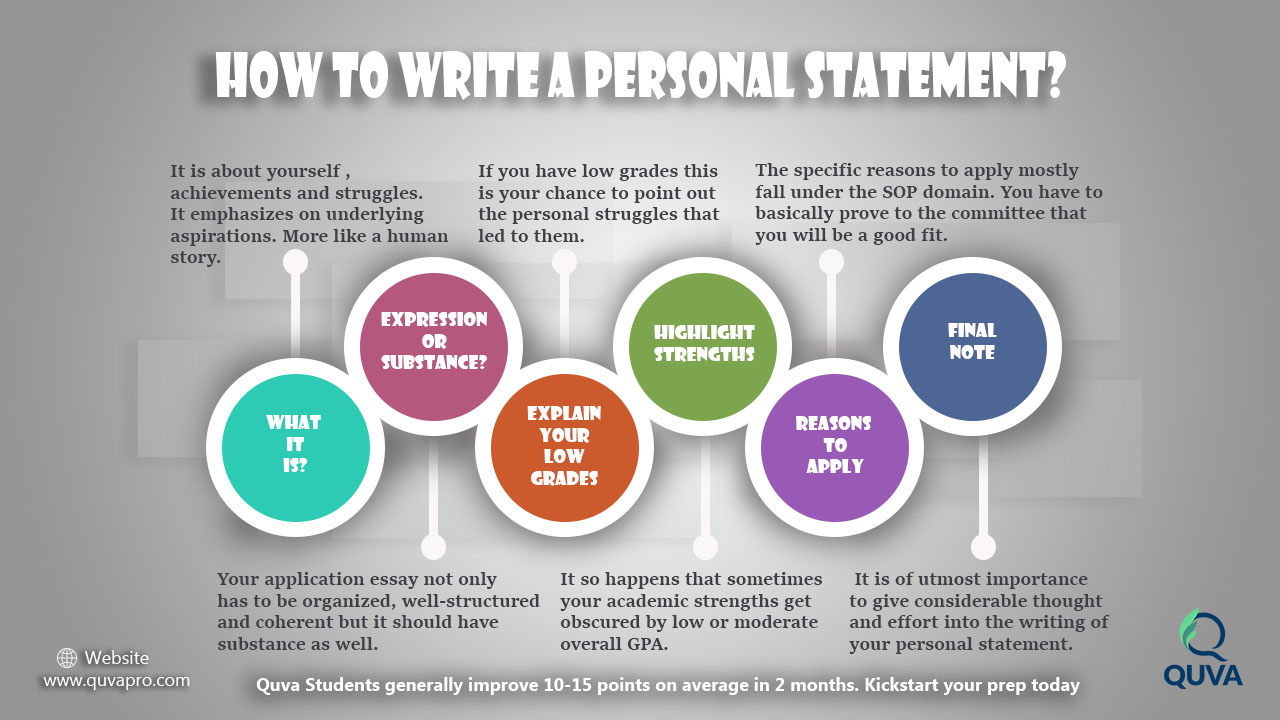Interested in GRE and Graduate Admission Discussions? Join our facebook group.
Besides requiring your transcripts and resumes that list your grades and achievements, graduate schools also require you to write one or two essays about yourself as part of your applications. The most common of these essays are the personal statements and/or the statements of purpose. These two terms (sometimes used interchangeably, other times meaning slightly different but related things) are defined in most application forms and clear instructions are provided on how to write these essays. This makes the personal statement an essay that is customized to the particular program or university that you’re applying to. There are, however, certain features that are common to every personal statement. Given below is a list of facts and guidelines that are applicable to most personal statements.
What a Personal Statement is & what it is not
Article Index
As the name implies, a personal statement is a statement about yourself: about your life’s achievements, struggles, motivations and goals that relate to the program that you’re applying to. What it is not is a mere listing of accolades or activities, your transcript and resume is already there to do that. That does not mean that you cannot write about your achievements in a personal statement, but that the emphasis should not be on the achievements themselves but the underlying aspirations behind them. You should be able to clearly explain what drives and motivates you, what personal struggles you had to overcome to achieve what you achieved and how your journey connects with your future goals and the graduate program you’re applying to. A personal statement has a narrative touch to it; it is a human story, an opportunity to tell the admissions committee about you as a person.
Expression or Substance?
While it is true that eloquence and quality of expression do matter, too much flowery language without solid content will get you nowhere. One of the things that reviewers judge about you from your personal statement is how clearly you express yourself in written English, but that is not the primary purpose of the personal statement. If there is no substance in your personal statement, then no amount of grandiloquent vocabulary and ornate language can fill that vacuum.

Having underscored the importance of content, I must stress, however, that this does not mean that the structure of your personal statement is insignificant. Your ideas must be presented in a coherent manner, with logically connected paragraphs having no gaps and leaps. Needless to say, a statement written in a haphazard way will make a very negative impression. Your application essay has to be organized, well-structured and coherent.
Explain your low Grades
We have already discussed how you can showcase your achievements and motivations in your personal statement. In addition, the personal statement is also your opportunity to explain any shortcomings in your academic transcript. If you have low grades in certain subjects, or have a low overall GPA, this is your chance to point out extenuating factors or personal struggles that led to that. This may include medical reasons, or the fact that you had to do side-jobs to support dependents, or anything that is a genuine excuse for having struggled academically.
Personal Statement and Study objectives
Fulbright Scholar and Harvard Law School student Zariya Mushtaq shares invaluable tips regarding personal statement and study objectives.
Posted by Quva on Sunday, February 24, 2019
Highlight Strengths
This point is connected to the previous point pertaining to grades. It so happens that sometimes your academic strengths get obscured by low or moderate overall GPA. For example, it may be that you had stellar grades in the courses most relevant to your intended graduate program. Or it may be that you excelled in the advanced or hard courses but did not score too well in the easier ones, leading to a low CGPA. You should highlight such points in your personal statement.
Specific Reasons to Apply
This point applies to most personal statements if not all. Why not all? Because for some applications that require both a personal statement and a statement of purpose (SOP), the specific reasons to apply mostly fall under the SOP domain (e.g. you cannot write what follows, in your Fulbright personal statement. At any rate, it is important to note that the reviewers need to know precisely why you want to apply to their program. This part of the personal statement/SOP has to be very specific: you have to be able to convince the committee why exactly is that particular program within that particular university well-suited to your academic objectives. In doing so, you should mention specific professors and their research that you think is aligned with your previous work. You have to basically prove to the committee that you will add value to the ongoing academic pursuits in their department and that you will be a good fit.
A Final Note
A final word on the personal statement is that while a well-written personal statement does not guarantee you admission, a poorly written one certainly has the potential to get your application rejected. It is of utmost importance to give considerable thought and effort into the writing of your personal statement. You will have to edit your draft many times before you arrive at something worth submitting.
Quva Students improve 10-15 GRE points on average in two months. Kickstart your prep today.
